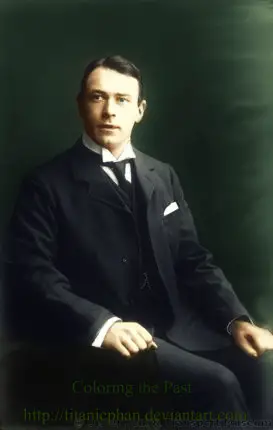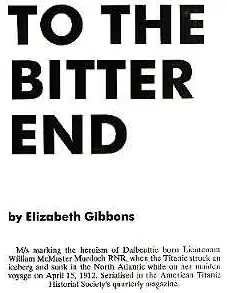18. Inspection and Evacuation
With the engines still at full astern, without a counter order the Titanic would start to back; Captain Smith somewhere during this time telegraphed half ahead. There were now a bewildering series of commands to the engine room. Boxhall was sent to inspect, found nothing, was then sent for the ship's carpenter, and met him rushing up to the bridge; water was pounding into six forward compartments. The Captain sent for Thomas Andrews. Smith walked into the wheelhouse and looked at the commutator. The Titanic had been listing 5 to port most of Sunday; she now listed 5 to starboard. (Seaman George McGough claimed to have overheard the carpenter telling the Captain it was a 10 list.) Smith's comment was instinctive: "Oh, my God". Even without Andrews to tell him, he now knew the time he dreaded had arrived.
Somewhere in this interval the engines were stopped for the last, final time. Passengers were now out on decks, asking questions, speculating, exchanging stories of funny noises and a horrible icy monster sliding by. One astute passenger, Elizabeth Shutes, noticed that the air had a sinister, clammy odor, like the inside of a cave. Lawrence Beesley, peering down 75 feet to the Atlantic, saw tiny waves licking gently against the ship's side, the sea black and calm and far away. The Titanic, he remembered, just sat there, solid and very still. He wondered what was wrong. Forward on C Deck, passengers and crew had discovered ice, and in the closing moments of shipboard innocence were carting bits off to show friends, playing with it, and chewing on it.

Thomas Andrews.
On the bridge, Thomas Andrews had now arrived. He left to survey the ship, then came back and calculated the damage, conferring in muted tones with Captain Smith; everyone else waited quietly. In the officers' quarters, Lightoller and Third Officer Pitman had gone back to their beds; both had been awakened by the sudden jar and had rushed onto the deck in bare feet and pajamas: now they waited. Unflappable Fifth Officer Harold Lowe, asleep in his cabin, stayed that way; when Boxhall was sent to rouse him, he awoke, listened, went back to sleep. On the forward welldeck, Chief Officer Henry Wilde and a party of men were trying to discover why the hatch covers were billowing and where the hissing sound came from: air was being displaced by water down below.
In forward boiler rooms, engineers and firemen and stokers fled the icy North Atlantic, now slithering around their feet, pouring through the starboard hull; they ran up ladders, then heroically went back down on command, began to draw the fires and start the pumps. Few of these men would live to see daylight. All the engineers would stay below to keep the power on for the passengers and the wireless operators to the last possible moment, and die to a man. After this night, by order of King George V, British marine engineers will share the royal color, wearing their badge of rank on a purple background, for valor.
In the night air, hundreds of feet above the keel, a nightmare sound bounded into the silence: steam was being released through every escape valve on the funnels, a livid and terrifying sound that seemed to Lawrence Beesley as if myriad locomotives were simultaneously blowing off steam. Decades later, First Class Passenger Washington Dodge, Jr., in 1912 just 5 years old, could still remember that hideous roaring noise.
There is no comment on what Murdoch was doing at this time. Captain Smith had resumed personal command. As Officer of the Watch, he remained on the bridge, and waited. The initial assumption logical enough based upon past experience that the ship should be damaged either minimally or not at all was eroding incrementally with the starboard list and the messages from below; the steam that exploded into the first minutes of April 15th really was the crack of doom. The decisionless void between 11:40 pm and the first minutes of Monday morning, when he could do nothing except wait, were undoubtedly the worst moments of William Murdoch's life.
Andrews now told Smith that all was useless; Andrews did not favor the euphemistic phrase. Able seaman Edward John Buley, on his first merchant ship after 13 years in the Royal Navy, was off duty, reading in the mess, when the ship struck. He described to Senator Fletcher what happened next:
"Mr. Buley. . . . One of our chaps went and got a handful of ice and took it down below. They turned in again. The next order from the chief officer, Murdock, was to tell the seamen to get together and uncover the boats and turn them out as quietly as though nothing had happened. They turned them out in about 20 minutes." (Page 604)
Captain Smith, with some 2200 souls and room in the lifeboats for 1178, ordered the Titanic evacuated. He was imprecise about how. When the port boats were ready, Lightoller, unable to be heard easily because of the steam still shrieking out of the funnel valves, cupped his hand and shouted into the Captain's ear, should he start loading women and children? Smith nodded. Lightoller took that to mean only women and children; all that night he declined to let men enter the boats he launched, turning back even stewardesses, presumably honorary men for the occasion. The sole exception to Lightoller's interpretation of the Captain's nod would be First Class passenger Arthur Peuchen, Major, The Queen's Own Rifles, Vice Commodore of the Royal Canadian Yacht Club in Toronto; Peuchen, under Lightoller's express command, climbed down nearly 70 feet of falls to help free No. 6.
